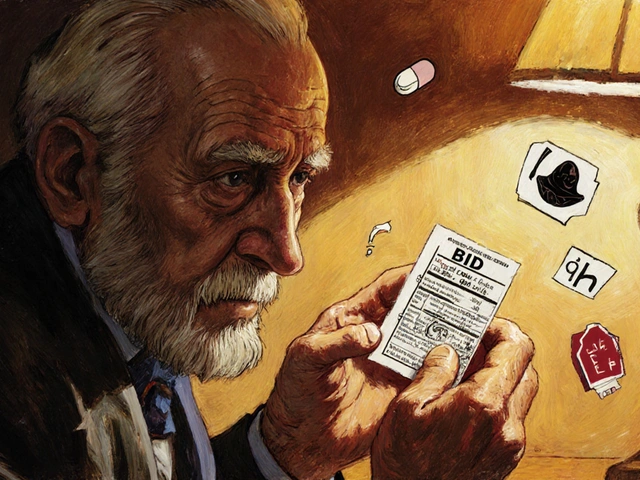Sexual Desire Quiz
This interactive quiz helps you explore your sexual desires and preferences. Answer the questions honestly to gain insight into what turns you on and what you value in intimacy.
1. What excites you most during intimate moments?
2. How important is communication about desires in your relationship?
3. Do you often reflect on your sexual experiences?
4. Have you ever explored a new fantasy or kink?
5. How would you describe your comfort level discussing sexuality with a partner?
Ever wonder why some nights feel electric while others feel flat? The missing piece is often a clear picture of what truly turns you on and why. Understanding your own sexual desires and preferences isn’t just a ‘nice‑to‑have’ for the bedroom - it’s a cornerstone of personal well‑being, confidence, and healthier relationships.
Quick Take
- Knowing what you want boosts confidence and reduces anxiety.
- It improves communication, making partner discussions smoother.
- Self‑knowledge can uncover hidden kinks or fantasies that enrich intimacy.
- Ignoring desire patterns can lead to frustration, miscommunication, and unmet needs.
- Practical steps - reflection, journaling, and open dialogue - help you map your preferences.
What Are Sexual Desires the feelings, fantasies, and physical responses that draw you toward sexual activity?
The word sexual desires covers everything from a simple attraction to a well‑developed fantasy. For some, it’s a gentle touch; for others, it’s a bold role‑play scenario. These desires are shaped by biology, past experiences, cultural messages, and personal values. When you can label a desire - “I love light bondage” or “I’m aroused by sensual poetry” - you gain a tool for navigating both solo and shared pleasure.
Why Self‑Awareness the conscious understanding of your thoughts, emotions, and motivations Is the First Step
Self‑awareness acts like a mirror for your inner erotic landscape. By regularly checking in with yourself - noting what excites you, what feels off, and how your mood shifts - you create a feedback loop that fine‑tunes desire. Studies from the Journal of Sex Research show that individuals who actively explore their fantasies report 30% higher relationship satisfaction.
- Clarity reduces shame. Naming a kink or fantasy takes the power away from secret‑keeping.
- It guides healthier boundaries.
- It fuels personal confidence, spilling over into work and social life.
Barriers That Keep You From Exploring
Even with curiosity, many hit walls. Cultural taboos, religious upbringing, or past negative experiences can embed a sense of “this is wrong.” Body Image how you perceive your own physical appearance often plays a big role - feeling insecure can mute desire. Consent the voluntary agreement to engage in a specific activity also gets tangled up; if you’re unsure what you truly consent to, you’ll hesitate to voice it.
Practical Steps to Map Your Desires
- Journaling. Set aside 10 minutes after any sexual experience or erotic media consumption. Write what you liked, what felt neutral, and any lingering curiosity.
- Solo Exploration. Masturbation isn’t just release; it’s research. Try different toys, speeds, or mental scripts and note the intensity of each response.
- Use a Desire Checklist. Create categories - touch, visual, role‑play, power dynamics, sensory inputs - and tick where you feel a spark.
- Talk to a Therapist. A certified sex therapist can help untangle shame or trauma that clouds desire.
- Share with a Partner. When you feel ready, bring up one desire at a time, using “I” statements to keep the focus on personal experience.

Improving Communication the exchange of thoughts, feelings, and needs between people Around Desire
Good communication is the bridge between your inner map and shared intimacy. Start with a non‑sexual conversation about “what feels good” and progress to specific fantasies. Use clear language - “I’d love to try light spanking” - rather than vague hints. Practicing active listening when a partner shares their wants builds trust, making future talks easier.
Impact on Relationship Satisfaction the overall contentment and happiness within a romantic partnership
Couples who regularly discuss desires report higher intimacy scores. The Freedom & Trust Survey (2023) found that 78% of long‑term partners who explored new fantasies together felt “more connected” than those who stuck to routine.
- It prevents resentment caused by unspoken expectations.
- It encourages experimentation, which can reignite passion.
- It validates each partner’s individuality, reducing codependency.
Understanding vs. Ignoring Your Desires
| Aspect | Understanding | Ignoring |
|---|---|---|
| Emotional Well‑Being | Higher self‑esteem, reduced shame | Increased anxiety, possible depression |
| Physical Pleasure | More frequent orgasms, varied stimulation | Stagnant routine, lower arousal |
| Partner Connection | Open dialogue, deeper intimacy | Misunderstandings, hidden resentments |
| Personal Growth | Expanded self‑knowledge, confidence | Stunted sexual identity, missed opportunities |
Exploring Kink any non‑normative sexual interest or activity Safely
If a kink pops up on your checklist, approach it with curiosity, not judgment. Research the practice, talk about limits, and establish safe words. Remember, Consent the voluntary agreement to engage in a specific activity remains the non‑negotiable foundation.
Integrating Discovery Into Daily Life
Desire isn’t a static checkbox; it evolves with mood, stress, and life stage. Make a habit of revisiting your journal quarterly. Celebrate new likes, let go of outdated ones, and share fresh insights with partners. By treating desire as a living dialogue, you keep both your inner world and your relationships vibrant.
Frequently Asked Questions
How can I start a conversation about my desires with a shy partner?
Begin with a neutral setting and use “I feel” statements. For example, “I’ve noticed I’m curious about trying massage play. How do you feel about exploring that together?” This frames the talk as sharing personal feelings rather than a demand.
Is it normal for my desires to change over time?
Absolutely. Hormones, life experiences, and emotional shifts all influence what excites you. Regular self‑check‑ins help you stay aligned with your current preferences.
Can journaling really help me understand my fantasies?
Yes. Writing forces you to articulate vague sensations into concrete language, making patterns easier to spot. Over weeks, you’ll see which themes recur and which fade.
What if I feel guilty about a kink I discover?
Guilt often stems from cultural messaging. Educate yourself about the kink’s safety and prevalence. Talking it through with a therapist or a supportive community can neutralize shame.
How does body image affect sexual desire?
When you view your body positively, you’re more likely to fully relax and enjoy sensations. Conversely, self‑criticism can create tension, reducing arousal. Practices like mindful breathing and body‑positive affirmations can improve both image and desire.
At the end of the day, knowing what lights you up-whether it’s a soft whisper, a particular texture, or a daring scenario-gives you permission to claim pleasure on your own terms. That clarity fuels confidence, deepens connection, and keeps your sexual life as vibrant as any other part of who you are.






Written by Martha Elena
I'm a pharmaceutical research writer focused on drug safety and pharmacology. I support formulary and pharmacovigilance teams with literature reviews and real‑world evidence analyses. In my off-hours, I write evidence-based articles on medication use, disease management, and dietary supplements. My goal is to turn complex research into clear, practical insights for everyday readers.
All posts: Martha Elena